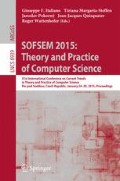Abstract
Traditionally, computations are seen as processes that transform information. Definitions of computation subsequently concentrate on a description of the mechanisms that lead to such processes. The bottleneck of this approach is twofold. First, it leads to a definition of computation that is too broad and that precludes a separation of entities that, according to prevailing opinions, do perform computation from those which don’t. Secondly, it also leads to a ‘machine-dependent’ notion of computation, complicating the identification of computational processes. We present an alternative view of computation, viz. that of a knowledge generating process. From this viewpoint, computations create knowledge within the framework of ‘more or less’ formalized epistemic theories. This new perception of computation allows to concentrate upon the meaning of computations – what they do for their designers or users. It also enables one to see the existing development of computers and information technologies in a completely new perspective. It permits the extrapolation of the future of computing towards knowledge generation and accumulation, and the creative exploitation thereof in all areas of life and science. The flux of our ideas on computation bring challenging new problems to the respective research, with wide connotations in the field of artificial intelligence, in cognitive sciences, and in philosophy, epistemology and methodology of science.
This work was partially supported by RVO 67985807 and the GA ČR grant No. P202/10/1333.
Access this chapter
Tax calculation will be finalised at checkout
Purchases are for personal use only
Preview
Unable to display preview. Download preview PDF.
References
Abramsky, S.: Two puzzles about computation. In: Barry Cooper, S., van Leeuwen, J. (eds.) Alan Turing: His Work and Impact, pp. 53–56. Elsevier (2013)
Aho, A.V.: Computation and computational thinking. Ubiquity 2011, Article No. 1 (2011)
Almond, P.: Machines like us, an interview by Paul Almond with John Searle. Machines Like Us (March 2009), http://machineslikeus.com/interviews/machines-us-interviews-john-searle-0
Bajcsy, R.: Computation and information. Comput. J. 55(7), 825 (2012)
Blass, A., Gurevich, Y.: Algorithms: a quest for absolute definitions. Bull. EATCS (81), 195–225 (2003)
Blum, L., Shub, M., Smale, S.: On a theory of computation and complexity over the real numbers: NP-completeness, recursive functions and universal machines. Bulletin of the American Mathematical Society 21(1), 1–46 (1989)
Chalmers, D.J.: Does a rock implement every finite-state automaton? Synthese 108, 309–333 (1996)
Conery, J.S.: Computation is symbol manipulation. Comput. J. 55(7), 814–816 (2012)
Denning, P. J.: What is computation? (opening statement). Ubiquity 2010, Article No. 1 ( October 2010)
Deutsch, D.: What is computation (How) does nature compute? In: Zenil, H. (ed.) A Computable Universe: Understanding and Exploring Nature as Computation, pp. 551–566. World Scientific Publishing Company (2012)
Fortnow, L.: The enduring legacy of the Turing Machine. Comput. J. 55(7), 830–831 (2012)
Frailey, D.J.: Computation is process. Ubiquity 2010, Article No. 5 (November 2010)
Fredkin, E.: What is Computation? (How) Does Nature Compute (Transcription of a live panel discussion, with participants Calude, C.S., Chaitin, G.J., Fredkin, E., Leggett, T.J., de Ruyter, R., Toffoli, T., Wolfram, S.). In: Zenil, H. (ed.) A Computable Universe: Understanding and Exploring Nature as Computation, pp. 673–726. World Scientific Publishing Company (2012)
Gurevich, Y.: Foundational analyses of computation. In: Cooper, S.B., Dawar, A., Löwe, B. (eds.) CiE 2012. LNCS, vol. 7318, pp. 264–275. Springer, Heidelberg (2012)
Peach, F.: Interview with David Deutsch. Philosophy Now (30), (December 2000/January 2001)
Rosenbloom, P.S.: Computing and computation. Comput. J. 55(7), 820–824 (2012)
Searle, J.: Minds, Brains and Programs. Behavioral and Brain Sciences 3, 417–457 (1980)
Searle, J.: Is the brain a digital computer? Proceedings and Addresses of the American Philosophical Association 64, 21–37 (1990)
Searle, J.: The explanation of cognition. Royal Institute of Philosophy Supplement 42, 103 (1997)
Searle, J.: The Rediscovery of the Mind. MIT Press, Cambridge (1992)
Turing, A.M.: On computable numbers, with an application to the Entscheidungsproblem. Proc. London Math. Soc. Series 2 42, 230–265 (1936)
Turing, A.M.: Systems of logic based on ordinals. Proc. London Math. Soc. Series 2 45, 161–228 (1939)
Valiant, L.: Probably Approximately Correct: Nature’s Algorithms for Learning and Prospering in a Complex World. Basic Books, New York (2013)
van Gelder, T.: What might cognition be, if not computation? The Journal of Philosophy 92(7), 345–381 (1995)
van Leeuwen, J., Wiedermann, J.: Knowledge, representation and the dynamics of computation. In: Dodig-Crnkovic, G., Giovagnoli, R. (eds.) Representation and Reality: Humans, Animals and Machines. Springer (to appear, 2015)
Wiedermann, J.: On the road to thinking machines: Insights and ideas. In: Cooper, S.B., Dawar, A., Löwe, B. (eds.) CiE 2012. LNCS, vol. 7318, pp. 733–744. Springer, Heidelberg (2012)
Wiedermann, J.: The creativity mechanisms in embodied agents: An explanatory model. In: 2013 IEEE Symposium Series on Computational Intelligence(SSCI), pp. 41–45. IEEE (2013)
Wiedermann, J., van Leeuwen, J.: How we think of computing today. In: Beckmann, A., Dimitracopoulos, C., Löwe, B. (eds.) CiE 2008. LNCS, vol. 5028, pp. 579–593. Springer, Heidelberg (2008)
Wiedermann, J., van Leeuwen, J.: Rethinking computation. In: Proc. 6th AISB Symp. on Computing and Philosophy: The Scandal of Computation - What is Computation?, AISB Convention 2013 (Exeter, UK), AISB, pp. 6–10 (2013)
Wiedermann, J., van Leeuwen, J.: Computation as knowledge generation, with application to the observer-relativity problem. In: Proc. 7th AISB Symposium on Computing and Philosophy: Is Computation Observer-Relative?, AISB Convention 2014 (Goldsmiths, University of London), AISB (2014)
Wikipedia (2013), http://en.wikipedia.org/wiki/Knowledge
Zenil, H.: What is nature-like computation? A behavioural approach and a notion of programmability. In: Philosophy & Technology (Special Issue on History and Philosophy of Computing). Springer (2013)
Author information
Authors and Affiliations
Editor information
Editors and Affiliations
Rights and permissions
Copyright information
© 2015 Springer-Verlag Berlin Heidelberg
About this paper
Cite this paper
Wiedermann, J., van Leeuwen, J. (2015). What is Computation: An Epistemic Approach. In: Italiano, G.F., Margaria-Steffen, T., Pokorný, J., Quisquater, JJ., Wattenhofer, R. (eds) SOFSEM 2015: Theory and Practice of Computer Science. SOFSEM 2015. Lecture Notes in Computer Science, vol 8939. Springer, Berlin, Heidelberg. https://doi.org/10.1007/978-3-662-46078-8_1
Download citation
DOI: https://doi.org/10.1007/978-3-662-46078-8_1
Publisher Name: Springer, Berlin, Heidelberg
Print ISBN: 978-3-662-46077-1
Online ISBN: 978-3-662-46078-8
eBook Packages: Computer ScienceComputer Science (R0)

